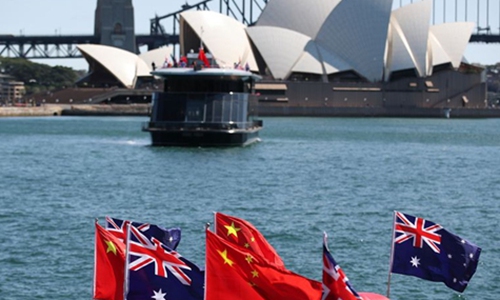Canberra might not directly play in new cold war with Beijing
Source:Global Times Published: 2020/6/11 22:23:54

Chinese and Australian national flags are seen at an event in Sydney, Australia, September 8, 2019. Photo:Xinhua
US Republican Senator Rick Scott, known for his extreme anti-China stance, urged Australia to play a crucial role in helping the US win a new cold war against China, The Sydney Morning Herald reported on Tuesday.
China-Australia relations have reached their lowest point since the beginning of the 21st century. Australia, lacking diplomatic independence and autonomy, is to a great extent manipulated by the US in foreign affairs. Some analysts even believe that Australia has already become a vassal state of the US.
Scott is a typical anti-China US senator. Such US politicians take advantage of their anti-China stance to gain political resources, and Australia has become one of their handy pawns. For example, some Australian officials hailed the global support for an independent investigation into COVID-19's origins due to the pressure from US President Donald Trump's administration.
The US has been pressuring Australia, which seriously affects the latter's diplomatic independence. Former Australian prime minister Paul Keating already called for a "more independent, balanced foreign policy" after Trump was elected as US president, the Guardian reported in November 2016. However, Australia still chooses to follow US steps to oppose China, seeking to demonstrate its loyalty to the US.
In addition to US manipulation and instigation, the deterioration of China-Australia relations has also transpired because of the rising trend of conservatism in Australia. The Liberal Party of Australia tends to overemphasize security issues and politicize China-Australia economics and even cultural exchanges. This will greatly harm the two countries' relations. Many Australian media outlets have helped hype China-Australia disputes. Australian-born American media mogul Rupert Murdoch has controlled a large portion of Australia's print media and cable TV news, which to some extent helped the US further jeopardize China-Australia ties.
In fact, Australia has already chosen a side between China and the US as China-US competition is intensifying. During the Trump era, Australia has decided to follow US geopolitical strategies toward China. It did not hesitate to act as a pawn of the US and thus has lost its diplomatic independence.
However, the Australian government may not directly respond to the so-called new cold war against China. Some Australian media, due to their above-mentioned close relations with the US, may proactively respond to Scott's views. The Australian "Wolverines," a group of Australian right-wing politicians who speak out against China, may also collude with those media. But the Australian government may not publicly support Scott's proposal. After all, many Australian businesspeople and industries are still dependent on their interests in China. Therefore it is unlikely that Australia will decouple from China.
Australia has put too much emphasis on security issues and security assurance from the US. However, no country in the Asia-Pacific region has actually threatened Australia's security. China is even less likely to threaten Australia since the two countries built a strong comprehensive strategic partnership in 2014.
Australia is aggressively coordinating with the US to attack China and hyping the so-called threats from China, while China is showing a defensive gesture. International education is Australia's fourth-largest foreign exchange earner, according to reports. Thus, there may be an economic impact on Australia after China's education authority issued an alert on Tuesday to Chinese students who are about to go to study in Australia, or prepare to return to Australia to continue their studies.
Australia has tried to collude with the US, which has damaged China-Australia ties. This bodes poorly for the land down under.
The article was compiled by Global Times reporter Li Qingqing based on an interview with Liu Qing, director of the Department for Asia and the Pacific Study at the China Institute of International Studies. liqingqing@globaltimes.com.cn
Posted in: VIEWPOINT,OTHER REGIONS